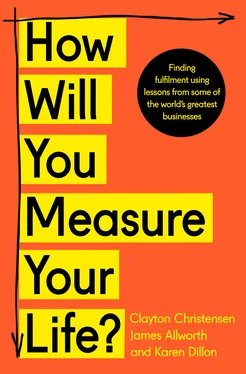Hopefully, you’ve had experiences in your life that have satisfied Herzberg’s motivators. If you have, you’ll recognize the difference between that and an experience that merely provides hygiene factors. It might have been a job that emphasized doing work that was truly meaningful to you, that was interesting and challenging, that allowed you to grow professionally, or that provided opportunities to increase your responsibility. Those are the factors that will motivate you—to cause you to love what you’re doing. It’s what I hope my students hold out for, because I know it can make the difference between dreading or being excited to go to work every day.
The lens of Herzberg’s theory gave me real insight into the choices that some of my classmates made in their careers after we graduated. While many of them did find themselves in careers that were highly motivating, my sense was that an unsettling number did not. How is it that people who seem to have the world at their feet end up making deliberate choices that leave them feeling unfulfilled?
Herzberg’s work sheds some light on this. Many of my peers had chosen careers using hygiene factors as the primary criteria; income was often the most important of these. On the surface, they had lots of good reasons to do exactly that. Many people view their education as an investment. You give up good years of your working life, years you would otherwise be making a salary. Compounding that is often the need to take out big loans to finance your time at school, sometimes while supporting young families—as I did. You know exactly how much debt you’ll have the minute you graduate.
Yet it was not lost on me that many of my classmates had initially come to school for very different reasons. They’d written their entrance essays on their hopes for using their education to tackle some of the world’s most vexing social problems or their dreams of becoming entrepreneurs and creating their own businesses.
Periodically, as we were all considering our postgraduation plans, we’d try to keep ourselves honest, challenging each other: “What about doing something important, or something you really love? Isn’t that why you came here?” “Don’t worry,” came back the answer. “This is just for a couple of years. I’ll pay off my loans, get myself in a good financial position, then I’ll go chase my real dreams.”
It was not an unreasonable argument. The pressures we all face—providing for our families, meeting our own expectations and those of our parents and friends, and, for some of us, keeping up with our neighbors—are tough. In the case of my classmates (and many graduating classes since), this manifested itself in taking jobs as bankers, fund managers, consultants, and plenty of other well-regarded positions. For some people, it was a choice of passion—they genuinely loved what they did and those jobs worked out well for them. But for others, it was a choice based on getting a good financial return on their expensive degree.
By taking these jobs, they managed to pay back their student loans. Then they got their mortgages under control and their families in comfortable financial positions. But somehow that early pledge to return to their real passion after a couple of years kept getting deferred. “Just one more year …” or “I’m not sure what else I would do now.” All the while, their incomes continued to swell.
It wasn’t too long, however, before some of them privately admitted that they had actually begun to resent the jobs they’d taken—for what they now realized were the wrong reasons. Worse still, they found themselves stuck. They’d managed to expand their lifestyle to fit the salaries they were bringing in, and it was really difficult to wind that back. They’d made choices early on because of the hygiene factors, not true motivators, and they couldn’t find their way out of that trap.
The point isn’t that money is the root cause of professional unhappiness. It’s not. The problems start occurring when it becomes the priority over all else, when hygiene factors are satisfied but the quest remains only to make more money. Even those engaged in careers that seem to specifically focus on money, like salespeople and traders, are subject to these rules of motivation—it’s just that in these professions, money acts as a highly accurate yardstick of success. Traders, for example, feel success and are motivated by being able to predict what is going to happen in the world and then making bets based on those predictions. Being right is almost directly correlated with making money; it is the confirmation that they are doing their jobs well, the measure they use to compete on. Similarly, salespeople feel success by being able to convince customers that the product or service they’re selling will help those customers in their lives. Again, money directly correlates with success—a sale. It’s an indicator for how well they’re doing their jobs. It’s not that some of us are fundamentally different beasts—we might find different things meaningful or enjoyable—but the theory still works the same way for everyone. If you get motivators at work, Herzberg’s theory suggests, you’re going to love your job—even if you’re not making piles of money. You’re going to be motivated.
Motivation Matters in Places You Might Not Expect
When you really understand what motivates people, it becomes illuminating in all kinds of situations—not just in people’s careers. My two oldest children taught me an important dimension of Herzberg’s theory on motivation. When we bought our first house, I saw a place in the backyard that would be perfect for building a kids’ playhouse. Matthew and Ann were the perfect ages for this kind of activity, and we threw our hearts into this project. We spent weeks selecting the lumber, picking the shingles for the house, working our way up through the platform, the sides, the roof. I’d get the nails most of the way in and let them deliver the finishing blows. It took longer that way, of course, figuring out whose turn it was for every stroke of the hammer and cut of the saw. It was fun, however, to see their feelings of pride. When their friends came to play, the first thing my children would do was take them into the backyard and show them the progress. And when I came home, their first question was when could we get back to work.
But after it was finished, I rarely saw the children in it. The truth was that having the house wasn’t what really motivated them. It was the building of it, and how they felt about their own contribution, that they found satisfying. I had thought the destination was what was important, but it turned out it was the journey.
It is hard to overestimate the power of these motivators—the feelings of accomplishment and of learning, of being a key player on a team that is achieving something meaningful. I shudder to think that I almost bought a kit from which I could have quickly assembled the playhouse myself.
If You Find a Job You Love …
The theory of motivation—along with its description of the roles that incentives and hygiene factors will play—has given me better understanding of how people become successful and happy in their careers. I used to think that if you cared for other people, you need to study sociology or something like it. But when I compared what I imagined was happening in Diana’s home after the different days in our labs, I concluded, if you want to help other people, be a manager. If done well, management is among the most noble of professions. You are in a position where you have eight or ten hours every day from every person who works for you. You have the opportunity to frame each person’s work so that, at the end of every day, your employees will go home feeling like Diana felt on her good day: living a life filled with motivators. I realized that if the theory of motivation applies to me, then I need to be sure that those who work for me have the motivators, too.
Читать дальше












